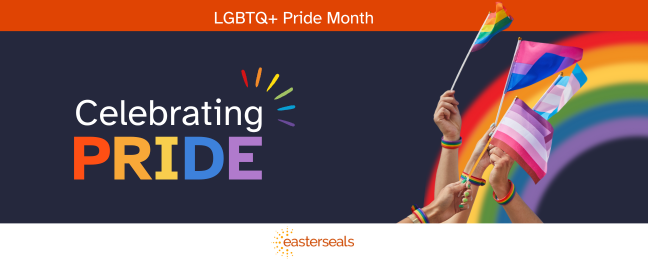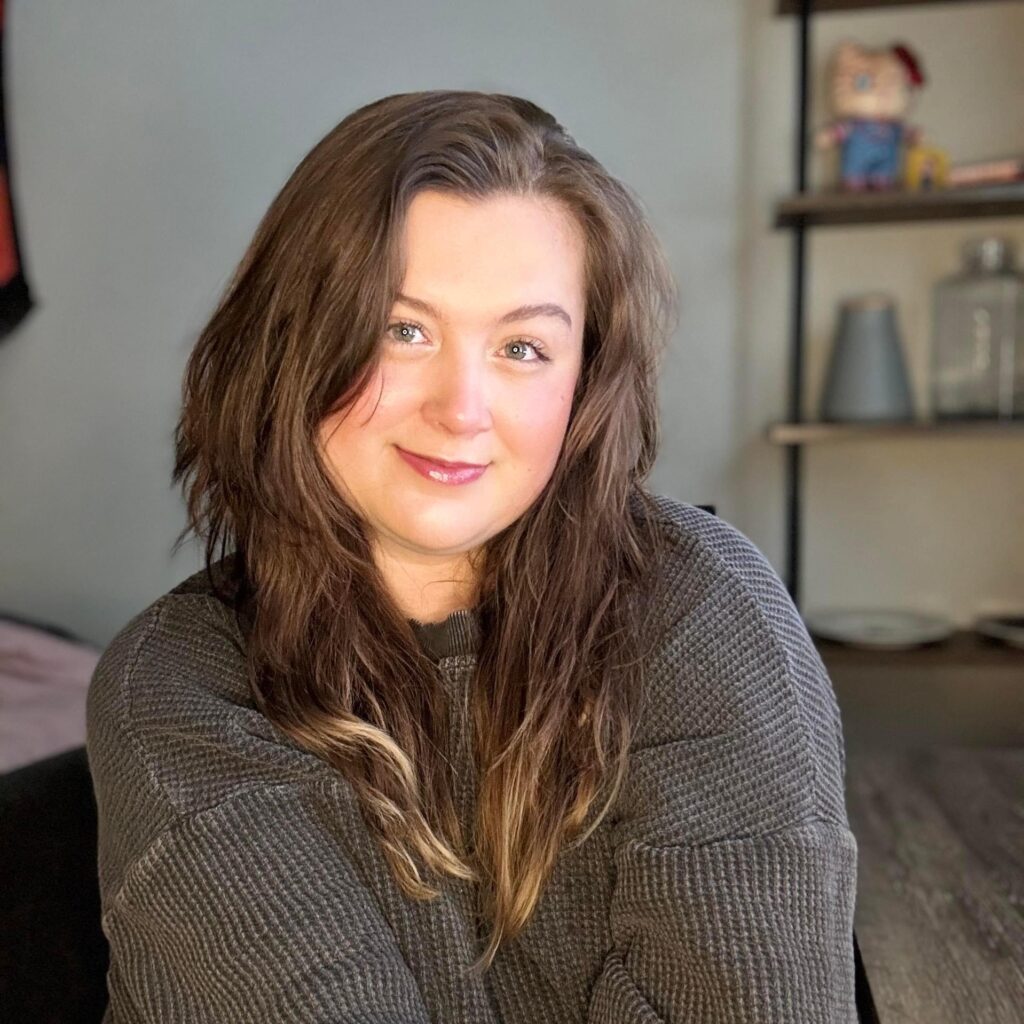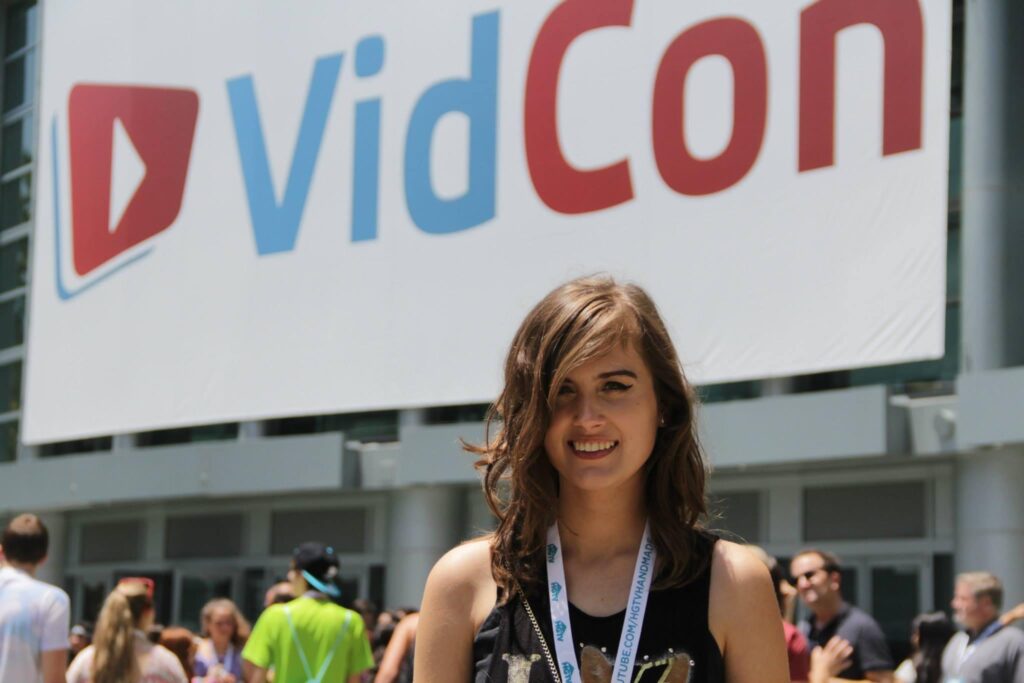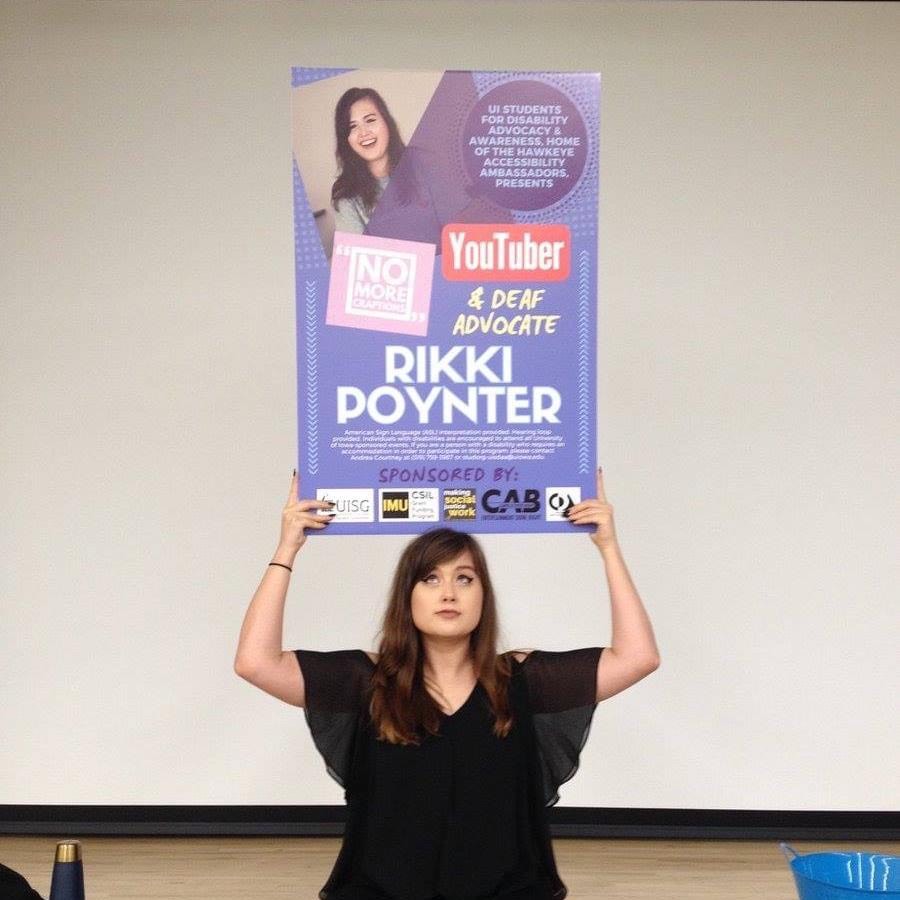Navigating Queer and Disability Spaces: Rikki Poynter’s Journey as a YouTuber
by Blog Writers

By Rikki Poynter
In 2010, I started a YouTube channel in hopes of finding anything and everything: friendship, community, career, a life.
I spent my entire life stuck in an abusive home that seemed impossible to get out of after high school because of ableism in society. I started off in the beauty niche until around 2013 when I started to lack inspiration, and it became too expensive to keep up with the newest trends and products on zero income. But what was a girl to do when makeup and YouTube were all that she knew?
 I’m deaf and I grew up mainstreamed. I went to public school before and after my diagnosis, had zero access to ASL (American Sign Language) and the deaf community, and zero access to, well, anything and everything, really. There was a deaf school about a half hour or so away from where we lived, and my dad knew about it, but nobody talked to me about it or asked me if I wanted to go. My mother, who became deaf at the age of three due to Rubella (German measles), grew up the same way. I’m pretty sure her upbringing inspired mine. After all, it was all she knew and all my dad knew. And the audiologists never brought up deaf schools or ASL, only spoken language and hearing aids that I guess we couldn’t afford since I never got them growing up.
I’m deaf and I grew up mainstreamed. I went to public school before and after my diagnosis, had zero access to ASL (American Sign Language) and the deaf community, and zero access to, well, anything and everything, really. There was a deaf school about a half hour or so away from where we lived, and my dad knew about it, but nobody talked to me about it or asked me if I wanted to go. My mother, who became deaf at the age of three due to Rubella (German measles), grew up the same way. I’m pretty sure her upbringing inspired mine. After all, it was all she knew and all my dad knew. And the audiologists never brought up deaf schools or ASL, only spoken language and hearing aids that I guess we couldn’t afford since I never got them growing up.
I was in my early 20s when I wanted to find out more about being deaf and the deaf community. It started with finding deaf makeup artists. From there, it spread to finding deaf people from all around the country on Tumblr. I then moved on to YouTube, where I found mostly deaf people that grew up in deaf families and with ASL. It was nice to see, but I still felt left out because I didn’t have that. I was hoping to also find more people like me.
With a little luck, I decided then that I wanted to make the shift from beauty content to talking about my life growing up as a deaf person who didn’t have ASL or a deaf community. Someone who grew up oral, but wanted to learn ASL. Someone who wanted to find that community. I also talked about accessibility on the Internet, the lack of captions on videos, and how to caption/subtitle videos. When I started to have chronic pain and fatigue, I talked about disability in general. That shift gained some success. I was making connections with other deaf and disabled people online and I was gaining traction on social media, something I was hoping to make some sort of career out of one way or another.
Fast forward to 2015 where I started to include more lifestyle content. Part of that included talking about sexuality: pansexuality, bisexuality, whatever it was at the time. (I use the term bisexuality now, but does it really matter?) I gained a few online LGBTQ+ friends from those videos too.
Things seemed to be going well. We’d engage with each other’s content, send each other messages, and look forward to meeting and seeing each other when events like VidCon and Playlist Live came around.

Rikki at VidCon
At first, socializing at events was great. A bit difficult, but great. Things weren’t perfect as communication sometimes fumbled due to lack of hearing aids and fluency in ASL (both from me and my hearing and non-signing peers), but I felt included. But things started to change as years went by. I began to feel more left out of both the disability and LGBT groups, and the LGBTQ+ groups were already difficult to feel included in because I always felt like I wasn’t “bisexual enough.”
I wasn’t invited to hangouts people had. If people hung out in groups at the afterparty events, I wasn’t invited to be part of the group. It was the same when they went to their hotel rooms to chill out after. Sometimes I’d text about plans and it felt like I was forgotten about because I didn’t receive a text back. Sometimes I did, with a “I’ll let you know!” but after that, nothing.
I know that I can be more difficult to socialize with due to the communication barrier. Deaf people don’t have personal interpreters at the hip, and interpreters typically aren’t hired to be at the afterparties and personal socializing sessions. Having to ask someone to repeat themselves constantly isn’t fun for either party. I fear that people think I think I’m “better” than them because I look like someone who doesn’t want to get involved in conversations and sits in the corner away from everyone else keeping to myself, when the reality is that I just have no idea what’s going on. It’s like Dinner Table Syndrome.
(Dinner Table Syndrome is when you are the only deaf person at the dinner table who signs. Family members and friends have a conversation aloud around the table and everyone but you understands, so you feel left out. This is typically used for the dinner table, especially during the holidays, but we use it for general outings too. I do, anyway.)
 With all of that being said about my hearing, non-signing peers, both in the disabled and LGBTQ+ communities and the spaces in general, I often feel out of place in deaf spaces as well. We talk a lot about lateral ableism within our own communities. Sometimes that is the case, and sometimes it’s really just our own lack of confidence. I’m always worried about my ASL skills not being enough, especially as one would think they’d be much better than they were when I first started learning in 2015. But lack of being in a signing environment consistently can have you struggling with ASL fluency. I worry that when I don’t understand something, they’ll be annoyed with me. I worry that when my signing is incomprehensible, they’ll be annoyed with me.
With all of that being said about my hearing, non-signing peers, both in the disabled and LGBTQ+ communities and the spaces in general, I often feel out of place in deaf spaces as well. We talk a lot about lateral ableism within our own communities. Sometimes that is the case, and sometimes it’s really just our own lack of confidence. I’m always worried about my ASL skills not being enough, especially as one would think they’d be much better than they were when I first started learning in 2015. But lack of being in a signing environment consistently can have you struggling with ASL fluency. I worry that when I don’t understand something, they’ll be annoyed with me. I worry that when my signing is incomprehensible, they’ll be annoyed with me.
Of course, it isn’t like this all of the time. I am grateful to the people that check in on me and ask me if I’d like to have coffee with them sometime. I’m grateful to my fellow deafies who allowed me to hang out with their group at the zoo this past weekend. I do still feel the most out of place in the LGBTQ+ spaces as it seems to be the hardest to connect to, but I enjoy seeing my peers and their posts on social media. We engage with each other’s queer-related posts from time to time, although it may not be as often as I’d like.
Regardless, I keep trying to find connections with people. If someone has an interest similar to mine, I’m excited to reply. If there’s something they have that I like, I want to compliment them on it. I want there to be a day where I no longer feel lonely and out of place, and I will continue to keep working toward that.
Rikki Poynter is a disabled (deaf, chronic pain and fatigue) accessibility consultant, writer, public speaker, and content creator. Originally a beauty vlogger on YouTube, she moved onto talking about her journey growing up as a mainstreamed deaf person trying to find her deaf identity and community all while trying to navigate an inaccessible world. Since 2013, she has talked about making the Internet accessible to deaf and hard of hearing people with captions, transcripts, and more. Her work has gotten the attention of many news outlets and she has worked with Apple, FireFox, Samsung, Google, and more.






